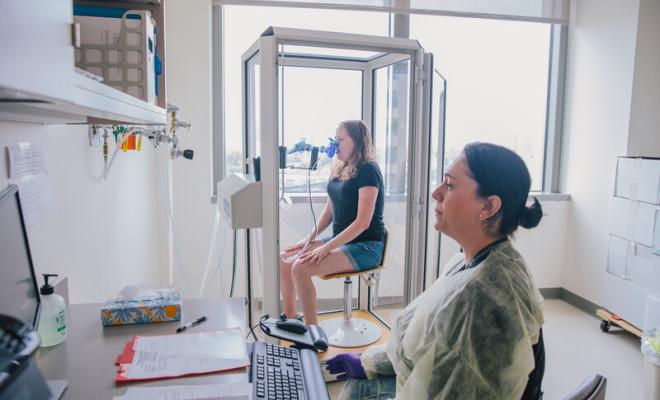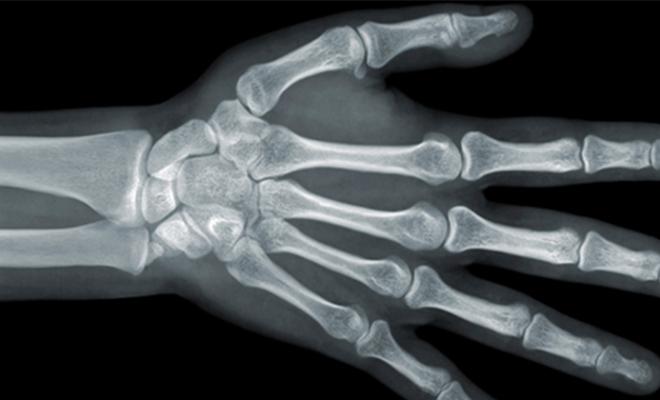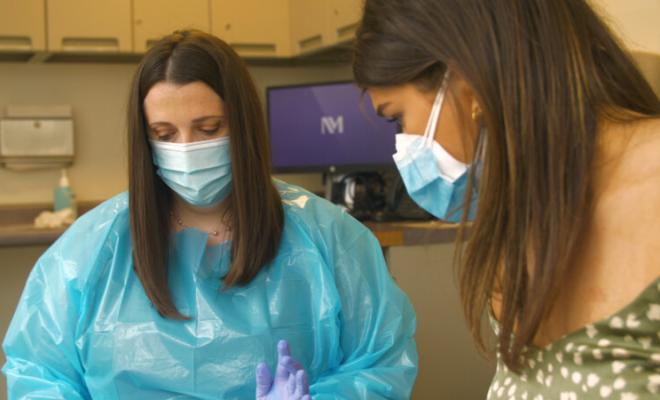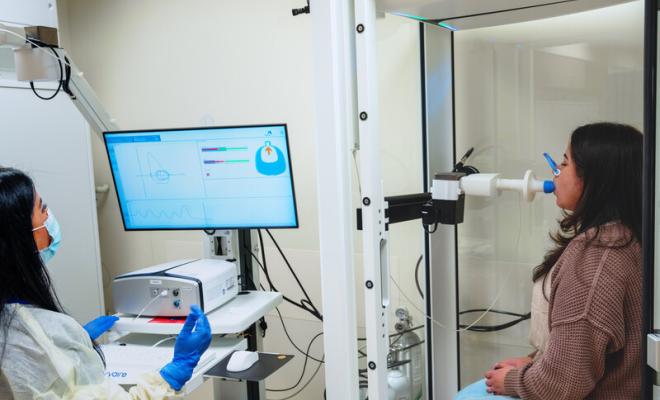To ensure that people with CF continue to experience steady gains in length and quality of life, the Foundation helps its accredited care centers provide a standard of CF care with guidelines. We base guidelines on the latest research, medical evidence, and consultation with experts on best practices.

Models of care provide guidance on delivery of care based on clinical evidence and expert opinion to improve outcomes in various aspects of CF care.
ARTICLE
The Cystic Fibrosis Foundation organized a multidisciplinary committee to reevaluate key aspects of the current care model and considered potential modifications based on a widening range of health needs among people with CF.
ARTICLE
The Cystic Fibrosis Foundation assembled a panel to summarize available evidence, synthesize expert opinion, and provide clinical guidance for the composition of the care team at an accredited CF center in the United States.
ARTICLE
Palliative care guidelines provide recommendations to help reduce physical and emotional symptoms and improve quality of life for people with cystic fibrosis throughout their lives.
ARTICLE
There is no consensus on the best model of care for individuals with CF to manage the non-pulmonary complications that persist after lung transplant. This position paper outlines two models of post-transplant care to accomplish optimal CF care after transplant.
Cystic fibrosis is a chronic, lifelong disease, requiring treatment that changes with the needs of the person with CF as he or she ages in order to maintain health. The standard of care for CF from infant to adult care is laid out by the Foundation in its clinical practice guidelines.

ARTICLE
Newborn screening for cystic fibrosis has been used in all 50 states and the District of Columbia since 2010. Significant variation exists, however, among newborn screening algorithms.

ARTICLE
These guidelines were developed by consensus based on expert opinion and a medical literature review to guide the monitoring and care of infants who have an abnormal cystic fibrosis newborn screening result, but do not meet the full criteria for a CF diagnosis.

ARTICLE
These preschool guidelines provide clinical care guidelines for people with cystic fibrosis between 2 and 5 years. It includes 53 recommendations intended to help make informed decisions in the care of preschool-aged children with CF.

ARTICLE
These clinical care guidelines from the Cystic Fibrosis Foundation provide recommendations on how best to care for adults with CF.

ARTICLE
This guideline is intended to help cystic fibrosis specialists and primary care providers care for people with CFTR-related metabolic syndrome/cystic fibrosis screen-positive, inconclusive diagnosis and their families. It should supplement the standard care provided in primary care.
Diagnosing cystic fibrosis is a multistep process. A complete diagnostic evaluation should include a sweat chloride test, a genetic or carrier test and a clinical evaluation at a CF Foundation-accredited care center.

ARTICLE
To help standardize the diagnosis of both infants with positive newborn screening results and older patients with what may be cystic fibrosis symptoms, the Cystic Fibrosis Foundation worked with CF medical experts to develop guidelines on the steps leading to a confirmed diagnosis.
ARTICLE
A well-performed and well-interpreted sweat test is the gold standard for accurately diagnosing cystic fibrosis. These guidelines were developed by consensus based on expert opinion and a review of the medical literature.
People with CF are at greater risk of getting lung infections because thick, sticky mucus builds up in their lungs, allowing germs to thrive and multiply. CF lung infections remain a serious and chronic problem for many living with the disease.

ARTICLE
Updated from 2003, these guidelines on infection prevention and control for cystic fibrosis provide recommendations for people with CF, their families, and health care providers to help reduce the spread of germs in the clinic and hospital setting, as well as in everyday life.

ARTICLE
Allergic bronchopulmonary aspergillosis is a hypersensitivity lung disease that results from exposure to Aspergillus fumigatus and occurs primarily in people with asthma or with cystic fibrosis. These guidelines were developed via a consensus conference of experts in 2003.

ARTICLE
Chronic infection with P. aeruginosa is associated with increased morbidity and mortality. Effective regimens include antibiotic therapy for newly acquired infection and routine surveillance with oropharyngeal cultures.

ARTICLE
Nontuberculous mycobacteria can cause chronic pulmonary infection or can reside in the lungs without causing progressive disease. Challenges include making decisions on when and how to initiate treatment.
Because nutrition is so important to a long and high-quality of life for people with CF, the CF Foundation has created several clinical care guidelines related to nutritional and gastrointestinal (GI) issues.

ARTICLE
These clinical care guidelines from the Cystic Fibrosis Foundation provide recommendations for colorectal cancer screening for adults with CF.

ARTICLE
Enteral tube feedings are an important treatment option in cystic fibrosis when oral intake is not adequate to meet nutritional goals. A multidisciplinary Cystic Fibrosis Foundation panel developed consensus evidence-based guidelines on all aspects of care regarding enteral feeding.

ARTICLE
Normal growth is associated with good lung function in children with CF. The CF Foundation gathered a team of experts to determine the best ways to ensure good nutrition for healthy growth.

ARTICLE
Nutritional support is a vital component of care for patients with cystic fibrosis. These recommendations cover caloric intake, dosing for pancreatic enzyme replacement therapy, and monitoring growth in childhood and weight status in patients of all ages.

ARTICLE
Pancreatic insufficiency (PI) remains a significant issue for the majority of individuals with cystic fibrosis. Recommendations include target doses of pancreatic enzyme replacement therapy (PERT) in infants, children, and adolescents.

ARTICLE
These guidelines present recommendations on vitamin D screening, diagnosis, supplementation and treatment in children and adults with cystic fibrosis.
ARTICLE
A panel of pediatric and adult gastroenterologists created this document to summarize and disseminate the existing medical literature regarding cystic fibrosis-specific gastrointestinal disease.

ARTICLE
The Cystic Fibrosis Foundation organized a multidisciplinary committee to develop a nutrition position paper to provide interim advice and considerations to the CF community around CF nutrition based on the rapidly changing nutrition landscape in CF.
Managing other health conditions related to cystic fibrosis is vital to maintaining the health and quality of life for a person living with the disease. Complications of CF can affect many different organ systems and can be caused directly by the malfunctioning CFTR protein or can be a result of treatments for CF.

ARTICLE
Despite its prevalence and impact, there is no CF-specific guidance for the assessment and management of pain. The Cystic Fibrosis Foundation assembled an expert panel of clinicians, researchers, people with CF, and caregivers to develop consensus recommendations for pain management in CF.

ARTICLE
As early cystic fibrosis-related diabetes (CFRD) may be clinically silent, these guidelines highlight the importance of regular screening. Management recommendations focus on insulin therapy and ongoing care by a team with knowledge of CF and diabetes.

ARTICLE
Prevention, early recognition, and treatment of cystic fibrosis-related bone disease are imperative to sustain bone health. This guideline provides recommendations regarding screening and treatment to optimize bone health in people with CF.

ARTICLE
The Cystic Fibrosis Foundation assembled a committee to evaluate research advances and revise guidelines for CF-associated liver disease.

ARTICLE
These guidelines were created to help care center teams to integrate screening and treating depression and anxiety into comprehensive cystic fibrosis care.

ARTICLE
This executive summary highlights key content from articles reviewing the pathogenesis, diagnosis, and management of CF endocrine disorders.

ARTICLE
These consensus statement recommendations were developed to help guide optimal care for children and adults with CF with otolaryngologic (ear, nose, and throat) disease.
Healthy lungs and maintaining lung function is central to the health of people with CF. Below is information on CF clinical care guidelines developed to help people with CF improve and maintain respiratory health.

ARTICLE
The Cystic Fibrosis Foundation assembled a multidisciplinary committee to create consensus statements that provide recommendations to lung transplant clinicians on the management of CF-specific comorbidities immediately before and after transplantation. The committee developed 32 recommendation statements and organized them into seven categories.

ARTICLE
To aid clinicians, patients, and families in the best use of modulators, the Cystic Fibrosis Foundation sponsored the creation of guidelines to inform discussions and support decision-making.

ARTICLE
These guidelines provide recommendations to the cystic fibrosis community regarding the management of advanced cystic fibrosis lung disease (ACFLD), including reducing practice variability, improving the quality of life and survival of those with ACFLD, and identifying future research directions.

ARTICLE
Airway clearance therapies improve the efficacy of the mucociliary escalator and elicit a cough. These guidelines reviewed and compared the various techniques and devices.

ARTICLE
These guidelines were developed by consensus based on expert opinion and a medical literature review to provide evidence-based recommendations for chronic medication use for lung health maintenance.

ARTICLE
Pulmonary exacerbations are common among people with cystic fibrosis, yet little is known about best treatment practices. These guidelines were developed by consensus based on expert opinion and a review of the medical literature.

ARTICLE
The purpose of these guidelines is to provide recommendations to the CF community regarding appropriate identification and timely referral of individuals with advanced CF lung disease to transplant centers.
ARTICLE
Hemoptysis and pneumothorax are complications reported in people with cystic fibrosis. This document reflects the Cystic Fibrosis Foundation's Pulmonary Therapies Committee recommendations for the treatment of hemoptysis and pneumothorax.